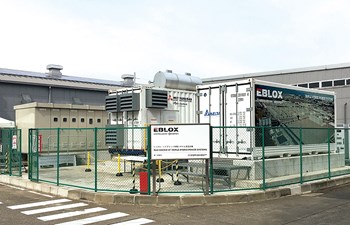 Traditional gas turbine generators have reached a critical conversion period. To develop a stand-alone power system that is environmentally-friendly and that meets the increasing demands for the event of disaster, Mitsubishi Heavy Industries built a new type of triple hybrid stand-alone power system, EBLOX, demonstrated in Sagamihara. The Mitsubishi triple hybrid stand-alone power system adopts Delta’s energy storage system, power conditioning system and solar inverter, and combines them with a gas engine generator, which was verified from November 2018.
Traditional gas turbine generators have reached a critical conversion period. To develop a stand-alone power system that is environmentally-friendly and that meets the increasing demands for the event of disaster, Mitsubishi Heavy Industries built a new type of triple hybrid stand-alone power system, EBLOX, demonstrated in Sagamihara. The Mitsubishi triple hybrid stand-alone power system adopts Delta’s energy storage system, power conditioning system and solar inverter, and combines them with a gas engine generator, which was verified from November 2018.
Purposes of this experiment is not only to verify the stand-alone power supply system operation with triple hybrid power source, but also to verify the ability of real-time frequency containment reserve (FCR) to the primary regulating force through control center dispatching and by combining gas engine power generation facilities and energy storage system. This can be applied for Japan’s power supply and demand regulating markets in the future and to achieve the virtual power plant (VPP) concept. The verification results are as follows:
1. At the time of off-grid operation and load increase, the energy storage system can instantly compensate for the gap before the generator starts.
2. When combined with renewable energy, the energy storage system can smooth the output of renewable energy, compensate the peak demand and supply stable power to the load end.
The verification results show that by using ICT and AI technology and using the energy storage system for regulation, the virtual power plant integrates the gas engine generator with renewable energy power generation into one platform. Through the estimation of renewable energy power generation, the control center can remotely control the increase/decrease of power generation of the gas turbine generator, and dispatch the energy storage system to cope with temporary peak loads or renewable energy power generation. This avoids the waste of abandoned PV or wind power generation.
The demand for virtual power plants is expected to increase in the future in response to a substantial global increase in renewable energy power generation and to satisfy power consumption in off-grid areas. The virtual power plant integrates traditional energy with new energy, uses energy storage system characteristics, adjusts power generation and power consumption efficiency, flexibly dispatches energy according to load demand, and maintains the stability of the power grid. In markets where electricity is freely traded, surplus power generation can be further stored in the energy storage system when electricity prices are low, and then resold to the market when electricity prices are high. Delta’s energy storage system is based on advanced power conversion and energy storage technology and will continue to play a key role in the future.
